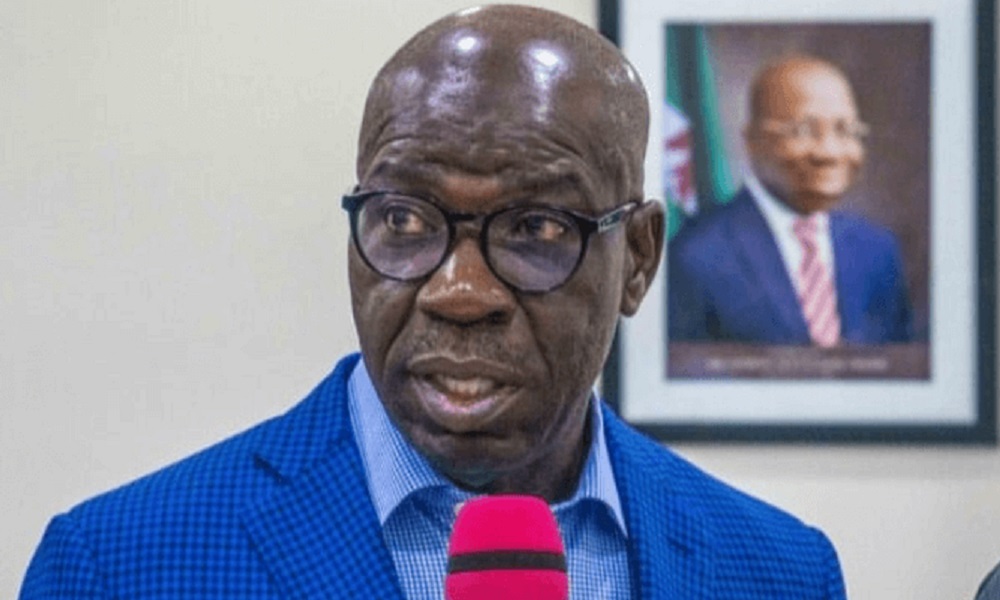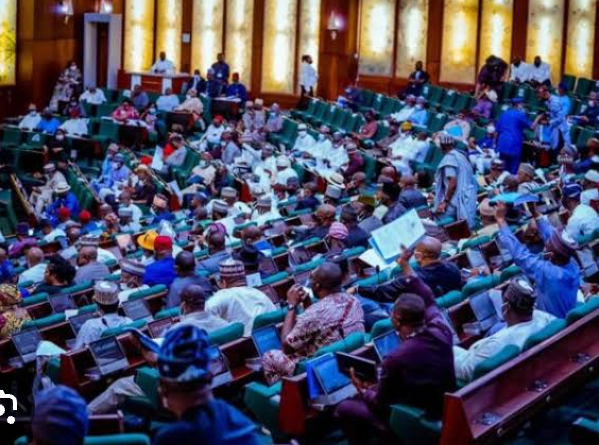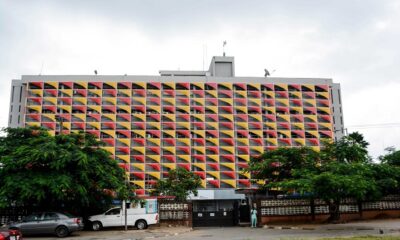News
Obaseki berates Okpebholo for shutting down the state’s e-governance platform

***Says, platform not controlled by non-state actors
By Francesca Hangeior
The immediate past Governor of Edo State, Godwin Obaseki, has berated his successor, Monday Okpebholo, for shutting down the state’s e-governance platform.
Reports have it that Okpebholo had said that the entire e-governance platform is being run and operated from the backend by unknown non-state actors, and no one within the whole public service of the state has administrative control of the platform.
In a statement through the Secretary to the State Government, Umar Ikhilor, the governor ordered an immediate review of the platform.
Okpebholo added that all officials and staff of Ministries, Departments and Agencies are to continue to work on the platform pending the outcome of the ongoing review.
However, Obaseki, in a statement on Tuesday by his spokesman, Crusoe Osagie, stated that Okpebholo’s excuses for shutting down the platform are shameful and regressive.
The former governor said Okpebholo’s decision was a sign of a clueless government and an insult to the sensibilities of Edo workers and the people of the state.
Obaseki stated that the platform is operated by the Edo ICT Agency, a parastatal under the Edo State Ministry of Digital Economy, with the support of expert consultants.
The statement read, “We read with surprise and deep disappointment the utterly ridiculous statement by the Secretary to the State Government (SSG), Umar Musa Ikhilor, where he laboriously attempted to justify the illogical shutdown of the Edo e-governance platform and the decision to revert the state’s civil service operations back to paper files to run the government.
“This irrational decision is not only shameful and regressive but also an insult to the sensibilities of Edo workers and the people of the state. It further exposes the government’s cluelessness and lack of the depth and knowledge required for effective governance and administration in the 21st century.
“To be clear, the platform is operated by the Edo ICT Agency, a parastatal under the Edo State Ministry of Digital Economy, with the support of expert consultants, ensuring a digital and efficient system for government processes and operations.
“However, the unprepared and clueless government of Senator Monday Okpebholo, having come into power through one of the most flawed electoral processes in the country, has since sacked most of the senior civil servants in the agency. As a result, the government is now hamstrung and unable to run the e-gov system effectively.
“Had the government not embarked on the ongoing indiscriminate sack of civil and public servants in the state, the officials and workers responsible for this system would have been available to explain and train them on the process and functionality of the digital system. But what else can we expect from a governor who came to power through the backdoor? He is unprepared for office, in short supply of ideas, and lacks a clear vision to drive the development and progress of the state.”
Obaseki also refuted allegations by the Okpebholo government that there is no institutional memory, saying that all government memory and data are stored in the state-owned Data Centre.
It added, “We also want to clarify that the allegations by the government that there is no institutional memory are completely false. All government memory and data are stored in the state-owned Data Centre, which was built and commissioned by the immediate past administration of His Excellency, Mr. Godwin Obaseki. The Data Centre is situated within the Government House compound, from where the Secretary to the State Government is dishing out his jaundiced statements, filled with lies and half-truths.
“For eight years, the immediate past governor, HE Godwin Obaseki, focused on nuanced policies and programmes to lay a solid foundation for the State, placing it on the path of progress and prosperity.
“We advise Okpebholo to follow this path if he doesn’t have a vision or plan for the state rather than erode the progress that has been made over these past few years with his illogical and poorly thought-out decisions and policies.”
News
Education Minister Urges NASS To Prioritise Takeoff Funding For Already Existing Institutions

By Gloria Ikibah
The Minister of Education, Dr. Olatunji Alausa, has called on the National Assembly to emphasise on funding for the effective take-off of already established institutions rather than creating new ones.
Dr. Alausa stated this at a public hearing organised by the House of Representatives Committee on Federal Polytechnics and Higher Technical Education, while presenting a memorandum on Thursday in Abuja.
The public hearing featured deliberations on three bills:
“A Bill for an Act to Establish the Federal College of Entrepreneurship and Skills Acquisition, Hawul Local Government Area, Borno State (HB.1797) – to provide full-time courses and training in technology, applied sciences, arts, social sciences, humanities, and management.
“A Bill to Amend Section 3(2)(b), the Second Schedule, and Section 31 of the Federal Polytechnics Act, Cap F17, Laws of the Federation of Nigeria, 2004 (HB.1413).
“A Bill to Amend the Federal Polytechnics Act, Cap F17, to review the functions of polytechnics (HB.2114)”.
The Minister speaking against the “Bill for an Act to Establish the Federal College of Entrepreneurship and Skills Acquisition, Hawul”, emphasised that the Federal Government maintains a policy of equitable distribution of federal institutions across states.
According to Alausa, no state should host more than one federal polytechnic, while every state must have at least one. Currently, all states except Sokoto and the Federal Capital Territory are covered under this arrangement.
He asserted that with limited resources, government efforts should be directed at strengthening existing institutions to deliver quality education rather than spreading resources thin by establishing new ones.
Alausa stated, “the Federal Ministry of Education has expanded avenues for establishing private tertiary institutions. States and individuals are encouraged to utilise these channels to support national educational development”.
In view of prevailing funding constraints, he recommended that deliberations on the proposed Federal College of Entrepreneurship and Skills Acquisition in Hawul, Borno State, be suspended.
He also urged the House to ensure that resources are dedicated to improving the quality of education for Nigerian students by consolidating support for already existing institutions.
With regards to the proposed amendments to the Federal Polytechnics Act, the minister raised no objections except for the provision seeking to include representatives of the National Board for Technical Education (NBTE) and the Manufacturers Association of Nigeria (MAN) on the Governing Council of Polytechnics.
“While both organisations play significant roles, their core functions do not directly align with the responsibilities of a polytechnic’s governing council. NBTE serves as a regulatory body, while MAN advocates for the interests of manufacturers”, he stated.
Earlier, the sponsor of the bill, Rep. Usman Balami (PDP–Borno), defended the proposal, citing insecurity and rising unemployment in Borno as pressing reasons for establishing the institution.
He described the proposed college as a strategic response to the growing number of unemployed youth and a means to equip them with skills necessary for self-reliance and economic empowerment.
“This institution will provide diverse training programmes tailored for today’s dynamic job market. It will bridge the gap between theory and practice, producing graduates ready to meet workforce demands”, Balami said.
According to the Borno lawmaker, the college will foster innovation, encourage entrepreneurship, and stimulate economic growth in the region by nurturing local talent and promoting a culture of self-employment.
Earlier in his remarks, the Committee Chairman, Rep. Fuad Laguda (APC–Lagos), noted a general consensus on the importance of skills acquisition in tackling unemployment.
He encouraged stakeholders to make robust contributions, assuring that the committee would carefully consider all submissions in its report.
“With the passage of these bills, Nigerians will have greater access to knowledge and skills in the arts, sciences, technology, humanities, and vocational and technical education,” Laguda said.
He also commended the leadership of the House for their support and the trust reposed in the committee to drive meaningful legislative outcomes.
News
Reps Resolve To Investigate Technical Glitch In 2025 UTME

By Gloria Ikibah
The House of Representatives has resolved to probe the technical fault that resulted in the widespread failure recorded in the 2025 Unified Tertiary Matriculation Examination (UTME).
This resolution was sequel to the adoption of a motion of urgent public importance by Rep. Adewale Adebayo, from Osun state on Thursday at plenary.
Naijablitznews.com recalled that the Joint Admissions and Matriculation Board (JAMB) had released the results of the 2025 UTME on May 9, with a significant number of candidates posting poor scores.
Reports further revealed that over 78 percent of candidates scored below 200 marks out of the total 400 obtainable.
Following a prompt internal review, JAMB identified a major technical fault behind the results.
The Registrar of JAMB, Prof. Ishaq Oloyede, at a press conference held on Wednesday in Abuja, stated that 379,997 candidates were affected due to discrepancies linked to server issues.
According to Prof. Oloyede, these was due to faulty software updates by one of the technical service providers handling JAMB’s operations in the Lagos and South-East zones.
He explained that the glitch, which occurred during the first three days of the examination, prevented the proper uploading of candidates’ answers and the error remained undetected before the results were made public.
He announced that the affected candidates will be allowed to retake the examination between May 16 and May 19, 2025.
Presenting the motion on the floor of the House, Rep. Adebayo lamented the hardships faced by many Nigerians, including long travels to exam centres, only to be met with such setbacks.
Contributing to the debate, Rep. Sada Soli from Katsina praised the JAMB Registrar for owning up to the error and offering an apology to the public, and described Oloyede as a man of integrity who has also improved the board’s finances since assuming office.
However, Speaker Tajudeen Abbas stated that whether the registrar deserves commendation is a matter for the investigative committee to determine.
The House also urged the federal government to establish Computer-Based Test (CBT) centres in all local government areas across the country.
Lawmakers also urged JAMB to release the results of candidates who are below the age of 16.
The House unanimously adopted the motion through a voice vote.
News
32.9kg cocaine trafficking: 10 Thai sailors, ship convicted, fined $4.3m(Photos)

. Conviction will send strong warning to int’l drug cartel, local collaborators, says Marwa, commends NDLEA officers for diligent investigation and prosecution
After over three years of diligent prosecution by the National Drug Law Enforcement Agency (NDLEA), a Federal High Court in Lagos presided over by Justice Daniel Osiagor has convicted 10 Thai sailors and their vessel named MV Chayanee Naree for trafficking 32.9 kilograms of cocaine from Brazil into Nigeria through the Apapa seaport, Lagos.
The convicted sailors who are all nationals of Thailand include: Krilerk Tanakhan; Boonlert Hansoongnern; Jakkarin Booncharoen; Thammarong Put-tlek; Worrapat Paopinta; Marut Kantaprom; Werapat Somboonying; Urkit Amsri; Panudet Jaisuk and Amrat Thawom.
They were first arraigned before the court along with nine Nigerian suspects by NDLEA in February 2022 on offences bordering on conspiracy and unlawful transportation of the illicit drug consignment from Brazil to Nigeria. The vessel, the convicted sailors and the nine Nigerians were arrested on 13th October 2021, at the Apapa port in Lagos. The Nigerian suspects are: Samuel Messiah; Ishaya Maisamari; Ilesanmi Ayo Abbey; Osabeye Stephen; Gbenga Ogunfadeke; Kayode Buletiri; Rilwan Omotosho Liasu; Saidi Sule Alani and Jamiu Adewale Yusuf.
They were all subsequently charged to court over the illegal acts which NDLEA prosecutors argued contravened sections 11(a), 11 (b), and 14 (b) of the National Drug Law Enforcement Agency Act Cap N30 Laws of the Federation of Nigeria, 2004, and punishable under the same Act.
The convicted sailors had initially made a no-case submission which was dismissed following submissions by the prosecution that a prima facie case had been established against the vessel and its crew members. As a result, the trial judge ordered the convicted Thai sailors and others to open their defence on the charges against them.
Following the court ruling, the convicted sailors opted for a plea bargain agreement with the NDLEA and as a result, Justice Osiagor delivered his ruling at the resumed hearing of the matter on Thursday 15th May 2025.
Among other penalties, the judge convicted the Vessel MV Chayanee Naree for unlawful transportation of 32.9kg of cocaine into Nigeria and
ordered to pay a fine of $4 million or its Naira equivalent.
The 2nd – 11th defendants were convicted under section 25 of the NDLEA Act for permitting the use of the vessel for the unlawful transportation of 32.9kg of cocaine, while the 2nd, 3rd and 4th defendants were ordered to pay N100,000.00 each as punishment for the offence and in addition restitution in the sum of $50,000 USD each or its equivalent in Naira to the Federal Government of Nigeria. The 5th – 11th defendants are to pay N100,000.00 each and restitution in the sum of $30,000.00, bringing the total amount payable to Four Million Three Hundred and Sixty Thousand US Dollars ($4,360,000.00).
Justice Osiagor thereafter adjourned the trial of the nine Nigerian suspects to June 25.
While the prosecution was led by the Agency’s Director of Prosecution and Legal Services, DCGN Theresa Asuquo, supported by A. Adebayo and Paul Awogbuyi, the defence team was led by the trio of Messrs Babajide Koku, Femi Atoyebi and Tunde Adejuyigbe, all Senior Advocates of Nigeria (SAN).
In his reaction, Chairman/Chief Executive of NDLEA, Brig Gen Mohamed Buba Marwa (Rtd) said the court ruling was a strong message to the international drug cartel and their local collaborators that Nigeria will never be a safe hub for illicit drug trafficking. He commended the NDLEA prosecution team and officers of the Apapa Strategic Command involved in the arrest, seizure and investigation of the shipment for their diligence and resilience in following the case to a logical conclusion. He charged them not to relent in pursuing the other part of the case still pending.
-

 News17 hours ago
News17 hours agoTinubu Endorses Establishment of Forest Guards to Counter Terrorism, Banditry
-

 Opinion10 hours ago
Opinion10 hours agoHuman Capital Devt: The Rep Paul Nnamchi
-

 News4 hours ago
News4 hours agoAlleged cyber bullying: IGP re-arraigns VDM
-

 News16 hours ago
News16 hours agoNNPCL failed to remit N500bn revenue in 2024 – World Bank
-

 News16 hours ago
News16 hours agoFG launches smart police station in Abuja
-

 News6 hours ago
News6 hours agoBREAKING: PDP, NNPP Rep members abandon parties, lace boots with APC
-

 News10 hours ago
News10 hours agoSEE Current Black Market Dollar (USD) To Naira (NGN) Exchange Rate
-

 News10 hours ago
News10 hours agoNnamdi Kanu’s family wants court to ban NAN coverage of son’s trial or allow live streaming





















